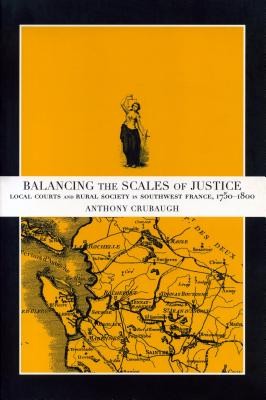
- We will send in 10–14 business days.
- Author: Anthony Crubaugh
- Publisher: Penn State University Press
- ISBN-10: 0271020784
- ISBN-13: 9780271020785
- Format: 15.2 x 22.9 x 1.6 cm, softcover
- Language: English
- SAVE -10% with code: EXTRA
Reviews
Description
Recent revisionist history has questioned the degree of social change attributable to the French Revolution. In Balancing the Scales of Justice, Anthony Crubaugh tests this claim by examining the effects of revolutionary changes in local justice on the inhabitants of one region in rural France.
Crubaugh illuminates two poorly understood institutions in eighteenth-century France: seigneurial justice and the revolutionary justice of the peace. He finds that justice was typically slow and expensive in the lords' courts, thus making it difficult for rural inhabitants to benefit from official channels of justice. By contrast, revolutionary reforms gave people the opportunity to submit quarrels to trusted and elected justices of the peace who adjudicated disputes quickly and inexpensively.
By juxtaposing seigneurial justice in the ancien régime with the institution of the justice of the peace after 1789, Crubaugh highlights how revolutionary changes in the system of dispute resolution profoundly affected members of rural French society and their relations with the French state. Over time rural dwellers came to accept the primacy of the state in resolving disputes, and the state thereby partially achieved its long-standing goal of penetrating rural areas.
EXTRA 10 % discount with code: EXTRA
The promotion ends in 20d.03:26:27
The discount code is valid when purchasing from 10 €. Discounts do not stack.
- Author: Anthony Crubaugh
- Publisher: Penn State University Press
- ISBN-10: 0271020784
- ISBN-13: 9780271020785
- Format: 15.2 x 22.9 x 1.6 cm, softcover
- Language: English English
Recent revisionist history has questioned the degree of social change attributable to the French Revolution. In Balancing the Scales of Justice, Anthony Crubaugh tests this claim by examining the effects of revolutionary changes in local justice on the inhabitants of one region in rural France.
Crubaugh illuminates two poorly understood institutions in eighteenth-century France: seigneurial justice and the revolutionary justice of the peace. He finds that justice was typically slow and expensive in the lords' courts, thus making it difficult for rural inhabitants to benefit from official channels of justice. By contrast, revolutionary reforms gave people the opportunity to submit quarrels to trusted and elected justices of the peace who adjudicated disputes quickly and inexpensively.
By juxtaposing seigneurial justice in the ancien régime with the institution of the justice of the peace after 1789, Crubaugh highlights how revolutionary changes in the system of dispute resolution profoundly affected members of rural French society and their relations with the French state. Over time rural dwellers came to accept the primacy of the state in resolving disputes, and the state thereby partially achieved its long-standing goal of penetrating rural areas.


Reviews